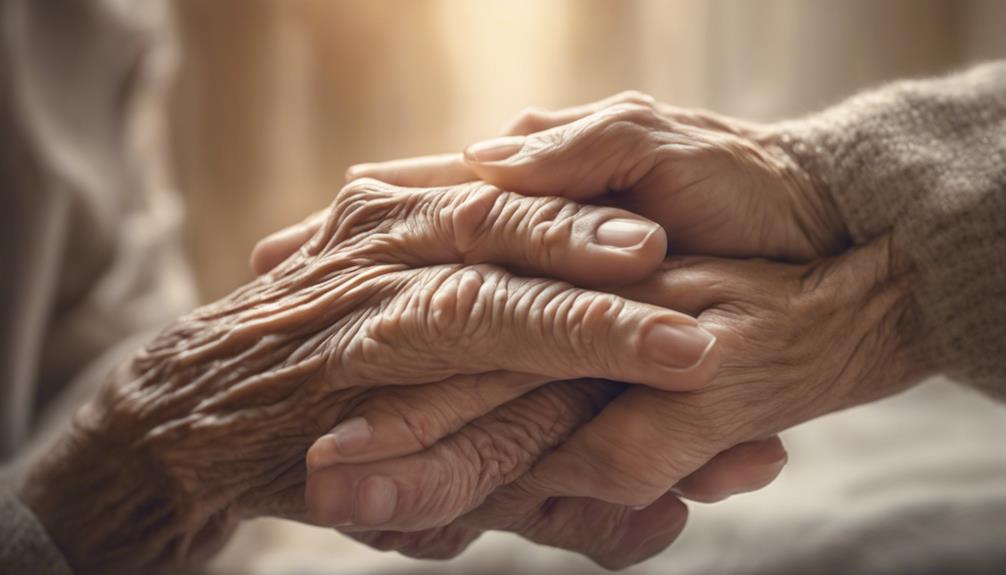To take care of yourself and your loved ones while providing care, it is important to be aware of signs of exhaustion and make self-care a priority. Engage in activities that bring joy and relaxation, while also setting boundaries to avoid burnout. Incorporate self-care practices into your daily routine to improve both mental and physical health. Practice effective communication by actively listening and building trust. Seek out support networks for both emotional and practical assistance. By balancing your responsibilities with your own needs, you can sustain a caring journey. Learn helpful strategies for compassionate caregiving to move forward in a supportive way. Recognize the emotional challenges that come with caregiving and allow yourself time to process and express difficult emotions. Remember that it is okay to ask for help and take breaks when necessary, as this can reduce stress and enhance your ability to care for others. Prioritizing your mental well-being and physical strength ensures that you can continue to offer compassionate and effective support.
Key Takeaways
- Prioritize self-care to prevent burnout and maintain well-being.
- Create a balance between caregiving duties and personal needs.
- Foster effective communication to build trust and understanding.
- Join support networks for emotional and practical assistance.
- Engage in daily self-care practices for mental and physical health.
Understanding Caregiver Burnout Prevention
To prevent caregiver burnout, it's essential to recognize the signs of exhaustion, irritability, and lack of concentration. Caregivers often focus so much on others that they neglect their own well-being. Self-care is critical in maintaining a healthy balance.
Engaging in activities that bring joy and relaxation, such as exercise, meditation, or pursuing hobbies, can help recharge our batteries. It's important to remember that taking care of ourselves isn't selfish; it's necessary to continue providing quality care to our loved ones.
Setting aside time for self-care may seem challenging, but it's essential for our overall well-being. By prioritizing self-care activities, we can prevent burnout and continue to support those who rely on us. Seeking help when needed and recognizing our limits are signs of strength, not weakness. Remember, we must care for ourselves to effectively care for others.
Implementing Self-Care Practices Daily

Implementing self-care practices daily is vital for caregivers to maintain their well-being and provide effective support to their loved ones. Caregivers often put the needs of others before their own, but taking care of oneself is essential for sustaining the ability to give care. Engaging in self-care routines daily can reduce stress, prevent burnout, and promote overall mental and physical health. By setting aside time each day for self-care activities, caregivers can recharge, refocus, and approach their responsibilities with renewed energy and positivity.
Prioritizing self-care daily not only benefits the caregiver but also enhances the quality of care provided to loved ones. Consistent self-care practices help in creating a sustainable caregiving routine that balances the needs of both the caregiver and the recipient of care. It's important to remember that self-care isn't selfish; it's a necessary part of being able to provide the best care possible. Remember, caring for yourself is an essential part of caring for others.
Balancing Responsibilities With Personal Needs
Finding a healthy balance between caregiving duties and personal well-being is essential for long-term caregiving success. Balancing responsibilities with personal needs involves prioritizing self-care while caring for loved ones. It means recognizing that your well-being is just as important as the care you provide.
Setting boundaries is essential to protect yourself from burnout. By allocating time for self-care activities such as meditation, exercise, or alone time, you can recharge and maintain balance. Remember, understanding the significance of your own needs is important for effective and sustainable caregiving. It's not selfish to take care of yourself; in fact, it's necessary to be the best caregiver you can be.
Communicating Effectively With Loved Ones

In our caregiving journey, fostering effective communication with our loved ones is paramount for building trust and understanding. When we take care to actively listen, express empathy, and validate their feelings, we create a supportive environment where open dialogue can flourish. By using a compassionate and non-judgmental tone, we can cultivate a safe space for honest conversations that enhance our relationships.
Clear and open communication is essential for understanding the needs and preferences of those we care for. Setting aside dedicated time for conversations allows us to explore further into their thoughts and emotions, nurturing connections that go beyond surface-level interactions. Remember, non-verbal cues such as maintaining eye contact and displaying supportive body language can convey understanding and empathy without uttering a word.
Seeking Support Networks for Caregivers
Joining support networks for caregivers offers invaluable emotional, practical, and social assistance in maneuvering the challenges of caregiving. These networks provide a nurturing environment where caregivers can share experiences, seek advice, and find solace in knowing they aren't alone. Support networks can take various forms, including:
- Online forums where caregivers can connect with individuals facing similar situations, offering a sense of community and understanding.
- Local support groups that meet in person, allowing caregivers to build relationships, share resources, and provide mutual support.
- Helplines and community organizations dedicated to assisting caregivers, offering immediate help, guidance, and access to valuable resources.
Frequently Asked Questions
What Is the Hardest Part of Being a Caregiver?
Balancing personal needs with caregiving is tough. Witnessing loved ones decline is emotionally taxing. Dealing with uncertainty and making hard decisions overwhelms. Managing guilt and self-doubt is distressing. Coping with exhaustion is the hardest part.
When Being a Caregiver Is Too Much?
When being a caregiver is too much, it's important to recognize signs of burnout, seek help, and delegate tasks. Prioritize self-care by scheduling breaks, engaging in enjoyable activities, and setting boundaries. Remember, asking for assistance is a sign of strength.
What Do Caregivers Need Most?
As caregivers, we need understanding, support, and practical tools to thrive. Recognizing the importance of self-care, boundaries, and appreciation can help us prevent burnout and maintain our well-being. Caregivers need holistic support to fulfill their roles effectively.
When Should You Stop Being a Caregiver?
When it's time to stop being a caregiver, we must remember our own well-being. Feeling overwhelmed, neglecting ourselves, or declining health are signs. Seeking help and open communication are essential. Prioritizing self-care guarantees effective caregiving.
Conclusion
To sum up, understanding caregiver burnout prevention, implementing self-care practices daily, balancing responsibilities with personal needs, communicating effectively with loved ones, and seeking support networks for caregivers are essential components of compassionate caregiving.
By taking care of ourselves and our loved ones, we can create a nurturing environment that fosters health and well-being for all. Remember, self-care isn't selfish, it's necessary for providing the best care possible.
Stay balanced, communicate openly, and seek support when needed.









